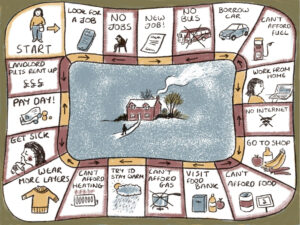News
Hidden Hardship: research into rural poverty in the North Cotswolds
7th February 2024
-
Share this:
- Share on facebook
- Share on twitter
- Share on linkedin
North Cotswold Foodbank has participated in a project looking at rural poverty in the North Cotswolds. The Hidden Hardship project was carried out by Dr Stephanie Denning, Assistant Professor at the Centre for Trust, Peace and Social Relations at Coventry University. It aims to understand the experiences, coping strategies and barriers to wellbeing of people in rural hidden hardship in the North Cotswolds.
Research into poverty has focussed on urban areas more than rural areas. However, we can’t assume that what happens in urban areas also happens in rural areas. Using participatory research with local people in the North Cotswolds, Stephanie spent time at community groups and projects in a rural town and village in the North Cotswolds in Spring and Summer 2023, to gain understanding of the experience of people living in rural hardship. She interviewed staff, volunteers, and local people at the projects. She then worked with three households experiencing rural hardship – they kept diaries of their experiences, and undertook three go-along interviews with Stephanie as they went about their daily life.
The report is written for national and local policymakers and community leaders to better understand hardship in the North Cotswolds: experiences of rural hardship, coping strategies, and barriers to improved wellbeing.
Rural hardship in the North Cotswolds is often hidden because of the relative affluence experienced by the majority, and the high levels of tourism in the area. The research found that hardship can be defined as struggle and tough times, reflecting daily struggle more than one-off ‘emergency’ situations. Rural hardship is not the same as urban hardship.
The causes of rural hardship can be summarised as ‘lacks of’, including government support and investment, employment, transport.
In people’s coping strategies, huge importance was given to informal support networks with friends and families, in addition to support offered by local groups although these could be difficult to access with limited transport options and a fear of stigma.
Barriers to improved wellbeing were to some degree perceived as outside of people’s control, which makes it difficult for people to envisage hardship improving. These included problems with transport, lack of government support and investment, and stigma/shame linked to inequality.
The report concludes with five implications for national and local policymakers and community leaders:
- Rural and urban hardship are not the same and each pose different challenges.
- People’s experiences of hardship often reflect ongoing daily struggle, rather than one-off ‘emergency’ situations.
- Many of the research participants living in hardship experienced challenges with their physical and/or mental health. Many had difficulty accessing medical appointments to improve their health.
- Rural hardship in the North Cotswolds is often hidden for the wealthier majority. This is played out in the contradiction of the strength and support of rural communities but with people in hardship experiencing or fearing stigma and shame.
- The ‘lacks of’ that cause and affect rural hardship need to be addressed in local and national government planning.
You can read more about the Hidden Hardship project here: https://hiddenhardship.coventry.ac.uk/
An exhibition is also being held at Coventry Cathedral, which is free to attend and is suitable for all ages. The Hidden Hardship Exhibition runs from 20th January to 26th February 2024 in the Chapel of Unity in Coventry Cathedral. The exhibition includes artwork by the professional illustrator Beth Waters to illustrate the interviews and diaries of local residents who took part in the research.

Image by Beth Waters
